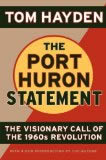
*From Camelot to Kent State:
by Joan Morrison, Robert K. Morrison
A look back at the major events of the 1960s, told by the voices the
famous and those they affected creating a powerful focus
on the human dimension of that turbulent decade.

*Common Ground: A Turbulent Decade in the Lives of Three American Families
by Pulitzer Prize-winning American journalist, J. Anthony Lukas
This is a story of the busing crisis in Boston.
The most acclaimed nonfiction
book of 1985 now in paperback.
 *The Dream and the Nightmare: The Sixties' Legacy to the Underclass
*The Dream and the Nightmare: The Sixties' Legacy to the Underclass
by: Magnet, Myron
"[Governor George W. Bush's ideas] have been shaped by a 1993 book that
blames the social and political permissiveness of the 1960s for many problems
since then. That book, The Dream and the Nightmare, argues that overzealous
efforts by the Haves to help the Have-Not's actually made their situation worse,
not better." ~ Dave McNeely, Austin American-Statesman

*Hippies From A to Z: Their Sex, Drugs, Music and Impact From the Sixties to the Present
by Skip Stone, Paul Williams
Truly impressive overview of the personalities and events of the Hippy Movement,
how they influenced the course of history and transformed American society! Read it for Free

*Imagine Nation: The American Counterculture of the 1960's and 70's.gif)
Peter Braunstein (Editor) Michael William Doyle(Editor)
Amidst the recent flourishing of Sixties scholarship, Imagine Nation is the
first collection of essays to focus solely on the counterculture. Fourteen
provocative essays seek to unearth the complexity and rediscover the society-changing
power of significant movements and figures. topics covered include feminism, psychedelic drug experimentation, guerilla
theatre, the New Left, Jimi Hendrix, communal living, underground comics, and
avant-garde film.

*The Long March : How the Cultural Revolution of the 1960s Changed America by Roger Kimball
In The Long March, Roger Kimball, the author of Tenured Radicals, shows how the "cultural revolution" of the 1960s and '70s took hold in America, lodging
in our hearts and minds, and affecting our innermost assumptions about what
counts as the good life. the author believes that the counterculture transformed
high culture as well as our everyday life in terms of attitudes toward self
and country, sex and drugs, and manners and morality and he intersperses his argument with portraits
of the life and thought of
Allen Ginsberg, Norman Mailer,Timothy Leary, Susan
Sontag, Eldridge Cleaver and other "cultural revolutionaries" who
made their mark. 1893554090
 *The Evergreen Review Reader: 1967 -1973
*The Evergreen Review Reader: 1967 -1973
by Barney Rosset (Editor)
From its first issue in 1957 to its final in 1973, Evergreen Review was hailed
as one of the most provocative magazines ever. The bible for a generation of
radicals and freethinkers, Evergreen championed Beckett and Brautigan, erotica
and liberal activism with an in-your-face attitude that confronted and challenged
the conventions of the day. Edited by Barney Rosset, this selection, which has
never been anthologized before, represents the best of the magazine's final
years - 1967 through 1973 - a politically and socially tumultuous half decade
that included such pivotal events as the assassinations of Robert Kennedy, Malcolm
X, and Che Guevara, the Democratic Convention in Chicago, and the massacre at
Mylai

*Hippies American Values by Timothy Miller
The hippies of the late 1960s were cultural dissenters who, among other things,
advocated drastic rethinking of certain traditional American values and standards.
In this survey, Miller (religious studies, U. of Kansas) traces the movement's
ethical innovations and analyzes the impact of its ideas on subsequent American
culture.

*The Last Innocent Year: America in 1964- The Beginning of the Sixties by: Jon Margolis
John Kennedy was dead, The Warren Commission was busily sifting evidence, Jackie
Kennedy was fast on her way to becoming an icon of dignified widowhood, and
Lyndon Johnson was tearing down Camelot to build the Great Society. Young men
started burning draft cards, rioting blacks burned whole neighborhoods, women
began to wonder if the male sex was their oppressor, Congress passed the Tonkin
Gulf Resolution (which escalated the war in Vietnam), and three civil rights
workers were killed in Mississippi. Jon Margolis, a former political reporter
for the Chicago Tribune, captures all the drama and emotion of this historic
year, recreating it from the perspective of the statesmen, celebrities, and
ordinary people who made its events come alive.

*Long Time Gone: Sixties America Then and Now (Viewpoints on American Culture) by Bloom, Alexander
Long Time Gone dispels myths about the Sixties and constructs an accurate vision
of the past and an understanding of its impact on the modern world. It is an
invaluable resource for anyone seeking deeper knowledge of this incredible decade
and its continuing influence on American culture.
* The Port Huron Statement: The Vision Call of the 1960s Revolution.
The Port Huron Statement: The Vision Call of the 1960s Revolution.
This SDS pamphlet helped shape the thought of the New Left for the next several years.
"The decline of utopia and hope is one of the defining features of social life today….the horrors of the 20th century, symbolized in the gas ovens and concentration camps and atom bombs, have blasted hopefulness.…To be idealistic is to be considered deluded…"Some would have us believe that Americans feel contentment amidst prosperity — but might it not better be called a glaze above deeply-felt anxieties about their role in the new world? "…We seek the establishment of a democracy of individual participation,…a participatory democracy….The political order should provide outlets for the expression of personal grievance and aspiration…"To turn these possibilities into realities will involve national efforts at university reform by an alliance of students and faculty. They must wrest control of the educational process from the administrative bureaucracy. They must make…contact with allies in labor, civil rights, and other liberal forces outside the campus. They must import major public issues into the curriculum….They must make debate and controversy…the common style for educational life."...Tom Hayden
originally written in 1962, this edition (2005) of The Port Huron Statement has an updated foreward by Tom Hayden.
 On the Ground: An Illustrated Anecdotal History of the Sixties Underground Press in the U.S.
On the Ground: An Illustrated Anecdotal History of the Sixties Underground Press in the U.S. *
*

 *
*


 *
*




 Prairie Radical A Journey Through the Sixties
Prairie Radical A Journey Through the Sixties Anti-war marches, human be-ins, rock festivals, psychedelic drugs, underground
newspapers, free universities, light shows, inner-city riots, radical skirmishes,
and hippie antics are chronicled by a member and in-house critic of the New
Left and counter culture. "Crowley provides a vivid portrait of one community
during the social upheavals of the sixties. It is stimulating, informative,
and entertaining". ~ Western Historical Quarterly.
Anti-war marches, human be-ins, rock festivals, psychedelic drugs, underground
newspapers, free universities, light shows, inner-city riots, radical skirmishes,
and hippie antics are chronicled by a member and in-house critic of the New
Left and counter culture. "Crowley provides a vivid portrait of one community
during the social upheavals of the sixties. It is stimulating, informative,
and entertaining". ~ Western Historical Quarterly.
 *
* *
* *
*
 *
*

 *
*